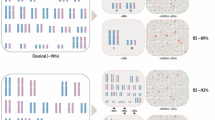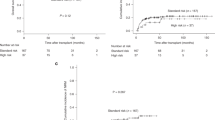Summary:
Patients with Philadelphia positive (Ph+) adult acute lymphoblastic leukaemia (ALL) have a poor prognosis. Stem cell transplantation (SCT) is increasingly being recognised as the treatment of choice in eligible patients with Ph+ALL, but disease-relapse remains a problem in a proportion of patients prior to and after SCT. Genetic abnormalities in addition to the Ph chromosome may influence the biology and clinical course of ALL, but there are not many studies on the potential genetic heterogeneity of adult Ph+ALL and clinical outcomes. Here, we report on five patients with ALL who were double Ph+ and also had a high-hyperdiploid karyotype (Ph+/hyperdiploid) at diagnosis. In contrast to the presence of the Ph+ chromosome, high-hyperdiploidy (>50 chromosomes) as the sole karyotypic abnormality in ALL is associated with a favourable clinical outcome. In our series, four patients with a Ph+/hyperdiploid karyotype achieved a cytogenetic remission after induction chemotherapy and proceeded to stem cell transplantation (SCT). The fifth had five subclones including Ph+/hyperdiploid, as well as those that were only Ph+; the latter emerged as the dominant clone after induction therapy and the patient died of disease-relapse. Of the patients who underwent SCT, only one relapsed, but achieved a durable remission with donor lymphocyte infusions. Thus, it is conceivable that the presence of high-hyperdiploidy as an additional karyotypic abnormality may confer a better prognosis to Ph+ALL, presumably by altering the kinetics of Ph+ neoplastic cells. We have discussed these results in the context of recent studies on the significance of high-hyperdiploidy in Ph+ adult ALL.
This is a preview of subscription content, access via your institution
Access options
Subscribe to this journal
Receive 12 print issues and online access
$259.00 per year
only $21.58 per issue
Buy this article
- Purchase on Springer Link
- Instant access to full article PDF
Prices may be subject to local taxes which are calculated during checkout
Similar content being viewed by others
References
Faderl S, Kantarjian HM, Thomas DA et al. Outcome of Philadelphia chromosome-positive adult acute lymphoblastic leukemia. Leuk Lymphoma 2000; 36: 263–273.
Goldstone AH, Prentice HG, Durrant J et al. Allogeneic transplant (related or unrelated donor) is the preferred treatment for adult Philadelphia chromosome positive (Ph+) acute lymphoblastic leukaemia (ALL). Results from the international ALL trial (MRC UKALLXII/ECOG E2993). Blood 2001; 98: 3556 (abstract).
Ribera JM, Oriol A, Parody R et al. Intensive chemotherapy (CHT), allogeneic (ALLO) or autologous (AUTO) stem cell transplantation (SCT) for adults with high-risk acute lymphoblastic leukaemia (HRALL). Results of PETHEMA ALL-93 trial. Hematol J 2002; 3: 1161 (abstract).
Stirewalt DL, Guthrie KA, Gooley T et al. Predictors of relapse in Philadelphia chromosome-positive acute lymphoblastic leukaemia after transplantation. Blood 2001; 98: 3092 (abstract).
Faderl S, Kantarjian HM, Talpaz M et al. Clinical significance of cytogenetic abnormalities in adult acute lymphoblastic leukemia. Blood 1998; 91: 3995–4019.
Moorman AV, Clark R, Farrell DM et al. Probes for hidden hyperdiploidy in acute lymphoblastic leukaemia. Genes Chromosomes Cancer. 1996; 16: 40–45.
Ito C, Kumagai M, Manabe A et al. Hyperdiploid acute lymphoblastic leukemia with 51 to 65 chromosomes: a distinct biological entity with a marked propensity to undergo apoptosis. Blood 1999; 93: 315–320.
Thomas X, Thiebaut A, Olteanu C et al. Philadelphia chromosome positive adult acute lymphoblastic leukemia: characteristics, prognostic factors and treatment outcome. Hematol Cell Ther 1998; 40: 119–128.
Rieder H, Ludwig WD, Gassmann W et al. Prognostic significance of additional chromosome abnormalities in adult patients with Philadelphia chromosome positive acute lymphoblastic leukaemia. Br J Haematol 1996; 95: 678–691.
Cytogenetic abnormalities in adult acute lymphoblastic leukemia: correlations with hematologic findings outcome. A Collaborative Study of the Group Francais de Cytogenetique Hematologique. Blood 1996; 87: 3135–3142.
Ribera JM, Ortega JJ, Oriol J et al. Prognostic value of karyotypic analysis in children and adults with high-risk acute lymphoblastic leukaemia included in the PEHEMA ALL-93 trial. Haematologica 2002; 87: 154–166.
Lee S, Kim DW, Kim YJ et al. Influence of karyotype on outcome of allogeneic bone marrow transplantation for adults with precursor B-lineage acute lymphoblastic leukaemia in first or second remission. Br J Haematol 2002; 117: 109–118.
Wetzler M, Dodge RK, Mrozek K et al. Prospective karyo-type analysis in adult acute lymphoblastic leukemia: the cancer and leukemia Group B experience. Blood 1999; 93: 3983–3993.
Dombret H, Gabert J, Boiron JM et al. Outcome of treatment in adults with Philadelphia chromosome-positive acute lymphoblastic leukemia–results of the prospective multicenter LALA-94 trial. Blood 2002; 100: 2357–2366.
Matsue K, Tabayashi T, Yamada K et al. Eradication of residual bcr-abl-positive clones by inducing graft-versus-host disease after allogeneic stem cell transplantation in patients with Philadelphia chromosome-positive acute lymphoblastic leukemia. Bone Marrow Transplant 2002; 29: 63–66.
Lewalle P, Soree A, Jacqy C et al. Molecular evidence of a GVL effect in allogeneic transplant for acute lymphoblastic leukaemia restricted to Ph-negative leukaemia: post-transplant immuno-modulation performed according to molecular follow-up seems efficient only in this subset of patients. Blood 2001; 98: 1630 (abstract).
Harrison GAN, Goldstone AH, Durrant IJ et al. Stem cell transplantation (SCT) and chemotherapy in the treatment of adult acute lymphoblastic leukaemia (ALL) in first complete remission (CR1): the need for individual patient data-meta-analysis. Hematol J 2002; 3: 1162 (abstract).
Author information
Authors and Affiliations
Rights and permissions
About this article
Cite this article
Tauro, S., McMullan, D., Griffiths, M. et al. High-hyperdiploidy in Philadelphia positive adult acute lymphoblastic leukaemia: case-series and review of literature. Bone Marrow Transplant 31, 763–766 (2003). https://doi.org/10.1038/sj.bmt.1703913
Received:
Accepted:
Published:
Issue Date:
DOI: https://doi.org/10.1038/sj.bmt.1703913



